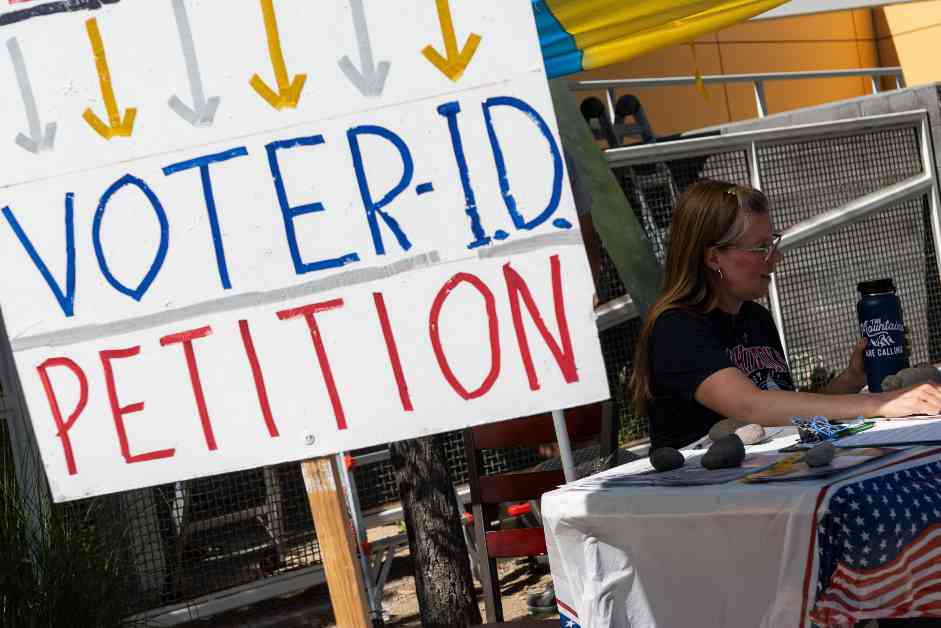Nevada voters will have the opportunity to decide on whether to implement a voter ID requirement in the upcoming November election. This potential change could be in effect as soon as the 2028 election, marking a significant shift in the state’s electoral process.
For years, there have been ongoing debates and efforts by Republican lawmakers to introduce voter ID laws in Nevada. The issue has been a point of contention between Democrats and Republicans at both the state and national levels. Republicans argue that voter ID is essential for ensuring the security and integrity of elections, while Democrats raise concerns that such requirements could disenfranchise voters who may not have access to valid forms of identification.
Despite the widespread support shown in polling data for establishing a voter ID requirement, Nevada is among the 14 states that currently do not mandate any form of identification for voters. Instead, the state relies on voters’ signatures to verify their identities at the polls.
The ballot question, known as Question 7, proposes to amend the Nevada Constitution to require all in-person voters to present a valid photo identification, such as a driver’s license, passport, student ID card, or concealed weapon permit before casting their votes. Additionally, those voting by mail would need to include a personally identifiable number, such as their driver’s license number or Social Security number, along with their signature.
If a majority of voters support Question 7 in the upcoming election, it will be placed on the 2026 ballot for another affirmative vote, which would ultimately lead to a constitutional amendment in Nevada.
The push for a voter ID requirement in Nevada was spearheaded by Repair the Vote, a political action committee led by former Clark County GOP Chair David Gibbs. The group filed the petition for the ballot question in November, prompting a swift legal challenge from Democratic-linked attorneys who argued that the measure’s description of effect failed to outline its full implications.
Despite the legal hurdles, a Carson City judge dismissed the lawsuit in February, a decision that was later upheld by the state Supreme Court in April. The initiative ultimately qualified for the November ballot after election officials verified over 131,000 valid signatures from across the state.
This is not the first time that Repair the Vote has attempted to introduce a voter ID ballot question. In 2022, a similar effort was blocked by a judge due to the argumentative nature of its description of effect. However, the group was able to overcome these challenges and secure a spot on the upcoming ballot.
Governor Joe Lombardo, a Republican, had previously introduced a bill to establish voter ID in Nevada, but the legislation did not receive a hearing in the Democratic-controlled Legislature. This lack of bipartisan support highlights the political divide over the issue of voter identification requirements.
Across the country, several states have implemented strict photo ID laws for voting, while others have less stringent requirements or accept alternative forms of identification. The debate over voter ID laws has been a contentious issue, with proponents emphasizing the need for election security and trust-building measures, while opponents raise concerns about potential disenfranchisement and barriers to voting access.
Proponents of voter ID argue that requiring identification is a standard practice in various aspects of daily life, such as purchasing alcohol, seeking medical care, or applying for educational opportunities. They contend that elections should be no different and that voter ID laws can help prevent fraud and ensure the integrity of the electoral process.
Supporters also point to the widespread public support for voter ID laws, as evidenced by a Nevada Independent poll that found 74 percent of respondents in favor of such requirements. Additionally, a 2008 study indicated that voter ID laws did not have a significant impact on voter turnout, further supporting the argument for their implementation.
On the other side of the debate, opponents of voter ID laws raise concerns about the potential barriers it could create for certain groups of voters. They argue that voter impersonation, the primary concern addressed by voter ID laws, is virtually nonexistent in the United States. Furthermore, opponents highlight the disproportionate impact that voter ID requirements could have on marginalized communities, such as rural areas and tribal populations, where access to identification may be limited.
A study conducted by University of California, Berkeley researchers in 2022 found that Black and Latino voters were disproportionately affected by voter ID laws in Texas, underscoring the potential for these requirements to exacerbate existing disparities in voter access and participation.
The financial implications of implementing a voter ID requirement in Nevada have also been a point of contention. The secretary of state’s office estimated that the initiative would cost the state approximately $6,750 to make necessary changes to voter check-in processes and mail ballot verification procedures. Additionally, concerns have been raised about the potential costs associated with providing free identification to voters to avoid imposing a “poll tax” and ensuring equitable access to the voting process.
The debate over voter ID laws in Nevada reflects broader national conversations about election integrity, access, and security. As the state prepares for the upcoming election, voters will have the opportunity to weigh in on this critical issue that has far-reaching implications for the democratic process. It remains to be seen how Nevadans will ultimately decide on Question 7 and whether the state will join the ranks of those with voter ID requirements in future elections.




